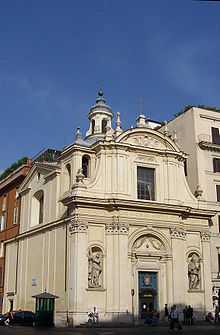Antoine Derizet

Antoine Dérizet (1697–1768), of Lyon, was an experimentally classicizing French Late Baroque architect who spent much of his career in Rome, where he designed the churches of Church of SS. Claudius and Andrew of the Burgundian (1729?),[1] where he experimented with reviving the High Renaissance central planning of a Greek cross surmounted by a central dome, and, facing Trajan's Forum, Santissimo Nome di Maria (1736–38),[2] which is elliptical in plan, with radiating chapels. He also provided designs for the marble revetment and stuccoes added to the interior of San Luigi dei Francesi (1759–64).[3]
Dérizet lectured at the Accademia di San Luca on his theory of proportional harmonies between music and architecture. These theories, akin to those common in the Renaissance[4] but currently fallen into desuetude, failed to convince the architect Giacomo Quarenghi, who attended the lectures, according to his remarks in letters to the mathematician Alexander Barca in Padua.[5]
A close friend was the painter-collector Adrien Manglard (1695-1760), his compatriot at the Accademia.[6]
There is a caricature of Dérizet by Pier Leone Ghezzi.[7]
Notes
- ↑ Date given in Touring Club Italiano, Roma e dintorni, 1965, p. 178.
- ↑ Dates given in Touring Club Italiano, Roma e dintorni, 1965, p. 143.
- ↑ Touring Club Italiano, Roma e dintorni, 1965, p. 200.
- ↑ See Rudolf Wittkower, Architectural Principles in the Age of Humanism, 1949.
- ↑ Robin Middleton, reviewing three Quarenghi studies for The Burlington Magazine 135 No. 1079 (February 1993), p 156.
- ↑ Olivier Michel, "Adrien Manglard, peintre et collectionneur (1695-1760)" in Mélanges de l'Ecole française de Rome 93.2 (1981).
- ↑ Bent Sorensen, "Panini and Ghezzi: The Portraits in the Louvre 'Musical Performance at the Teatro Argentina'" The Burlington Magazine 144 No. 1193 (August 2002:467-474) p. 473 note 43.
|